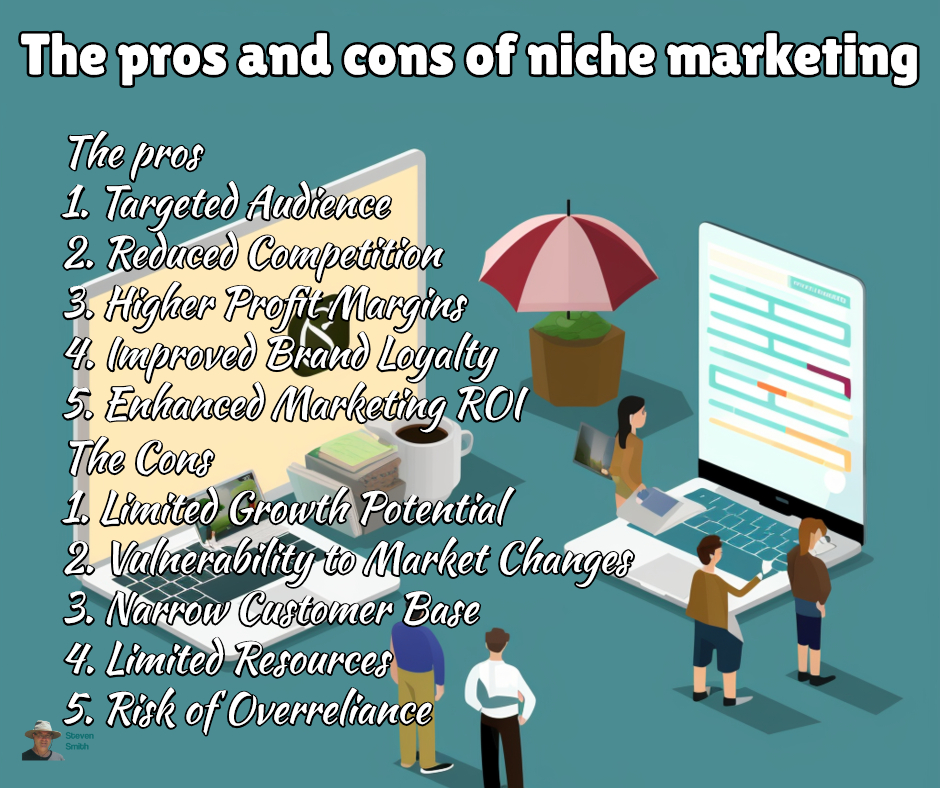Niche marketing is a strategy used by businesses to target specific segments of the market based on their unique needs, preferences, and behaviors. By focusing on a narrow and specialized market segment, companies can tailor their products, services, and marketing efforts to meet the needs of their target audience better. While niche marketing can be lucrative and effective for some businesses, there are drawbacks. In this blog post, we will discuss the pros and cons of niche marketing to help you determine if this strategy is right for your business.
Pros of Niche Marketing:
1. Targeted Audience: One of the most significant advantages of niche marketing is targeting a specific audience precisely. By focusing on a narrow market segment, businesses can tailor their products and services to meet their target customers' specific needs and preferences. This allows businesses to create more personalized and relevant marketing campaigns that resonate with their audience and drive higher conversion rates.
2. Reduced Competition: Niche markets are often less crowded and competitive than broad markets. By focusing on a specialized niche, businesses can carve out a unique position in the market and differentiate themselves from competitors. This can help companies stand out and attract loyal customers who are willing to pay premium prices for their products or services.
3. Higher Profit Margins: Niche markets often have higher profit margins than broad markets. By catering to a specialized audience with unique needs and preferences, businesses can charge higher prices for their products or services. This allows firms to increase their profitability and generate more revenue per customer compared to competing in a crowded and price-sensitive market.
4. Improved Brand Loyalty: Niche marketing can help businesses build strong customer relationships and foster brand loyalty. By focusing on a specific niche and delivering high-quality products and services that meet the needs of their target audience, businesses can create a solid emotional connection with their customers. This can lead to repeat purchases, referrals, and positive word-of-mouth marketing, which can help companies grow and thrive in the long run.
5. Enhanced Marketing ROI: Niche marketing can lead to higher return on investment (ROI) for businesses. Targeting a specific niche with personalized marketing campaigns allows companies to reach their target audience more effectively and efficiently. This can result in lower marketing costs, higher conversion rates, and higher ROI than broad marketing strategies targeting a larger and more diverse audience.
Cons of Niche Marketing:
1. Limited Growth Potential: One of the drawbacks of niche marketing is limited growth potential. By focusing on a narrow and specialized market segment, businesses may reach a saturation point where they cannot attract new customers or expand their market reach. This can limit the long-term growth and scalability of the business, especially if the niche market is small or the niche marketing strategy is not sustainable in the long run.
2. Vulnerability to Market Changes: Niche markets can be more susceptible to market changes and disruptions than broad markets. Changes in consumer preferences, technological advancements, or the competitive landscape can impact the viability and profitability of niche businesses. Businesses operating in niche markets may find adapting to changes challenging and staying competitive in the rapidly evolving market environment.
3. Narrow Customer Base: Niche marketing can lead to a narrow customer base, which may limit the growth and diversification of the business. Businesses may miss opportunities to attract new customers or expand into new market segments by focusing on a specific niche. This can make companies more vulnerable to economic downturns, changes in consumer behavior, or competitive threats that may affect the sustainability of the business in the long run.
4. Limited Resources: Niche marketing can require significant resources and investment to target and serve a specialized market segment effectively. Businesses operating in niche markets may need to allocate resources for market research, product development, and marketing campaigns to reach and engage their target audience. This can be challenging for small or start-up businesses with limited budgets and resources to compete with larger competitors in the market.
5. Risk of Overreliance: Niche marketing can make businesses overly dependent on a specific market segment or product category. If the niche market experiences changes or disruptions, companies may face challenges diversifying their revenue streams and mitigating the risk of overreliance on a single niche. This can make businesses more vulnerable to external factors that may impact the sustainability and profitability of the industry in the long run.
In conclusion, niche marketing can be a lucrative and effective strategy for businesses to target specific market segments with tailored products and services. Companies can attract loyal customers, increase profitability, and differentiate themselves from competitors by focusing on a specialized niche. However, niche marketing also has drawbacks, including limited growth potential, vulnerability to market changes, narrow customer base, limited resources, and risk of overreliance. Businesses considering niche marketing should carefully weigh the pros and cons to determine if this strategy aligns with their goals, resources, and long-term sustainability. Ultimately, if implemented strategically and effectively, niche marketing can be a powerful tool for businesses to succeed in a competitive market environment.
Thanks For Reading
Steven Smith


